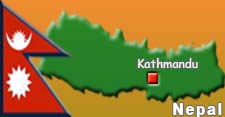Nepal's Maoist government promises unity, economic development
 Kathmandu - Nepal's Maoist-led government Wednesday unveiled its first policy goals since the abolition of the monarchy, aimed at social reconciliation and economic development.
Kathmandu - Nepal's Maoist-led government Wednesday unveiled its first policy goals since the abolition of the monarchy, aimed at social reconciliation and economic development.
The policy platform was read out by President Ram Baran Yadav in the constituent assembly, which also acts as an interim parliament.
"Taking the peace process to its logical conclusion, bringing about socioeconomic transformation and writing a new constitution in stipulated time will be the main priority of the government," Yadav said.
The platform reiterated an earlier Maoist position favouring public-private partnership and welcoming foreign investment in the country.
"Foreign investment would be allowed in national priority sectors and in areas where domestic investment alone does not suffice," Yadav said.
The government said it intended to bring about rapid economic transformation by implementing "new transitional economic policies" for which public-private partnership would be the base.
The Maoist-led government also said it wanted to see the country generating 10,000 megawatts of electricity within 10 years, and to stem the outflow of Nepalese youths seeking work as labourers in foreign countries.
It unveiled a plan to integrate Maoist guerrilla fighters into security forces including the national army within six months, and to form a Truth and Reconciliation Commission to probe cases of forced disappearances during the decade-long insurgency in the Himalayan nation.
Nearly 20,000 former guerrilla fighters are staying in 21 United Nations-monitored camps across Nepal while international agencies say more than 1,000 people remain missing.
The Maoists formed a government in August, in alliance with five other parties, after emerging as the single-largest party in the constituent assembly election in April.
The rebels formally ended their uprising in 2006 after signing a Comprehensive Peace Agreement. Nearly 14,000 people died in the fighting.
The constituent assembly has been given two and half years to draft a new constitution. (dpa)